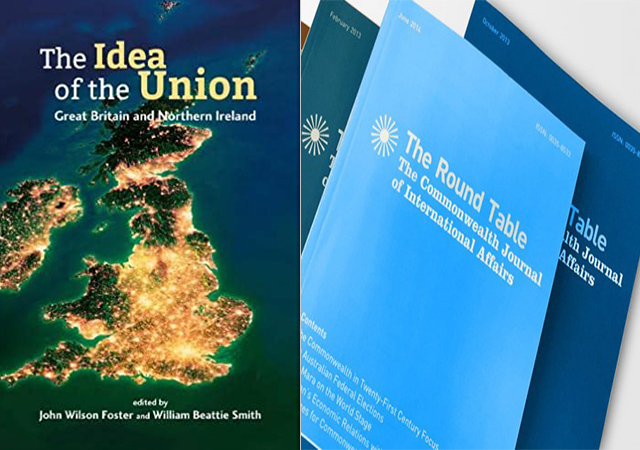
[This is an excerpt from an article in The Round Table: The Commonwealth Journal of International Affairs.]
For those who believe that the case for a strengthening of the ties between Northern Ireland and Great Britain has not been argued forcefully enough or loudly enough in recent years, this compact book will offer much solace. The book can also be seen as an antidote to the largely one-sided treatment, in much of the mass media, of the complex issues surrounding Northern Ireland and its place within the United Kingdom – a reality to which the feisty former Labour MP, Kate Hoey, draws attention in a Foreword to this volume. ‘[T]he Irish republican case for a united Ireland separated from Great Britain’, notes Hoey, ‘is being pushed by the media at the expense of any equivalent pro-Union argument’. (p. 7)
The media cannot, of course, be blamed entirely for the pro-Union argument not getting a fair wind, as Hoey herself acknowledges:
During my 30 years as a London MP I would meet many Northern Irish living in Great Britain. It was always the same story when they were pressed as to whether they spoke up for Northern Ireland. Their unionism was still firm but they kept quiet, usually making some reference to it being easier to say nothing. (p. 8)
No such reticence attaches to the contributors to this volume who span a range of backgrounds (academics, politicians, journalists) and specialisms (public policy, law, economics, history, government, strategic studies, international affairs, even urban planning). The book is set on a large canvas, dealing not only with the big, broad political and constitutional themes, as might be expected, but also with many ‘nuts-and-bolts’ issues, including those which are frequently considered too sensitive or simply too contentious to discuss openly.
Find out more about the Round Table, Britain’s first international affairs journal, founded in 1910
A particularly illuminating essay, by Geoff Sloan, an academic at the University of Reading, discusses the ‘geopolitical realities’ of the Union which have either been ignored or deliberately glossed over in many commentaries on Northern Ireland. Focusing on the interplay between the nature of the boundaries that separate diverse regions within nation states, on the one hand, and human associations – historical, socio-economic and cultural – which may not conform strictly to geographical boundaries, on the other, Sloan avers that many of those realities ‘have been consciously obscured by Irish nationalists and insufficiently challenged by successive British governments since the formation of the Irish Free State’. (p. 57). Sloan is scathing in his assessment of the ‘political trickery’ (p. 63) played by the Conservative Party at various times, ‘prioritising its own electoral interests’ (p. 62) over principled support for the Union.
Nowhere can this be seen more starkly than in the railroading of the Northern Ireland Protocol during the Brexit negotiations. The perfidy over the Protocol, as most Unionists would see it, is the subject of a lucid and forthright analysis by David Trimble who, it may be remembered, was one of the architects of the Belfast Agreement (also known as the ‘Good Friday Agreement’) concluded in 1998. Trimble minces no words in excoriating the Protocol which he considers to be not only a personal betrayal, but a major ‘threat to peace and economic prosperity in Northern Ireland’ (p. 342). Crucially, it is Trimble’s considered view that
The Protocol rips the very heart out of the Agreement, which I and [the unionist population] believed safeguarded Northern Ireland as part of the United Kingdom and ensured that democracy, not violence or outside interference, would or could ever change that. Make no mistake about it, the Protocol does not safeguard the Good Friday Agreement. It demolishes its central premise by removing the assurance that democratic consent is needed to make any change to the status of Northern Ireland.
No less instructive in the book are essays dealing with such matters as: how ‘legacy’ issues flowing from the Troubles (as the conflict in Northern Ireland has frequently been referred to in popular parlance) have been dealt with; the emergence of ‘lawfare’, i.e., the use of the courts to agitate contentious grievances which have traditionally not been seen as amenable to litigation; the rise – and relentless growth – of the ‘human rights industry’ within the province; and the post-Troubles ‘appeasement’ of Irish republicans by the British state. Perhaps most hard-hitting of all the analyses is an uncompromising assessment of the relative economic strengths of Northern Ireland and the Republic of Ireland, carried out by Graham Gudgin, a prominent economist. In addition to exploding the myth that Ireland is economically more dynamic than Northern Ireland, Gudgin draws pointed attention to the distorting effects, in public perceptions, of ‘the Republic’s status as one of the world’s largest tax havens’. (p. 326). His verdict is damning:
[A]fter 60 years as a tax haven and 48 years inside the EU, the Republic of Ireland has not managed to raise the living standards of its people to Northern Ireland levels. If the Republic were to rejoin the UK, it would be as the UK’s poorest region just as it was a century ago. While tax haven status and EU membership have worked for the Irish elite, the majority of Irish citizens have gained little. (p. 337)
What then, of the future? Is the hype surrounding media speculation about imminent Irish reunification justified? Hardly, if the analysis provided in this book is anything to go by.
The idea of the union: Great Britain and Northern Ireland is edited by John Wilson Foster and William Beattie Smith, place of publication not stated, Belcouver Press, 2021.
Venkat Iyer is the editor of the Round Table Journal.



